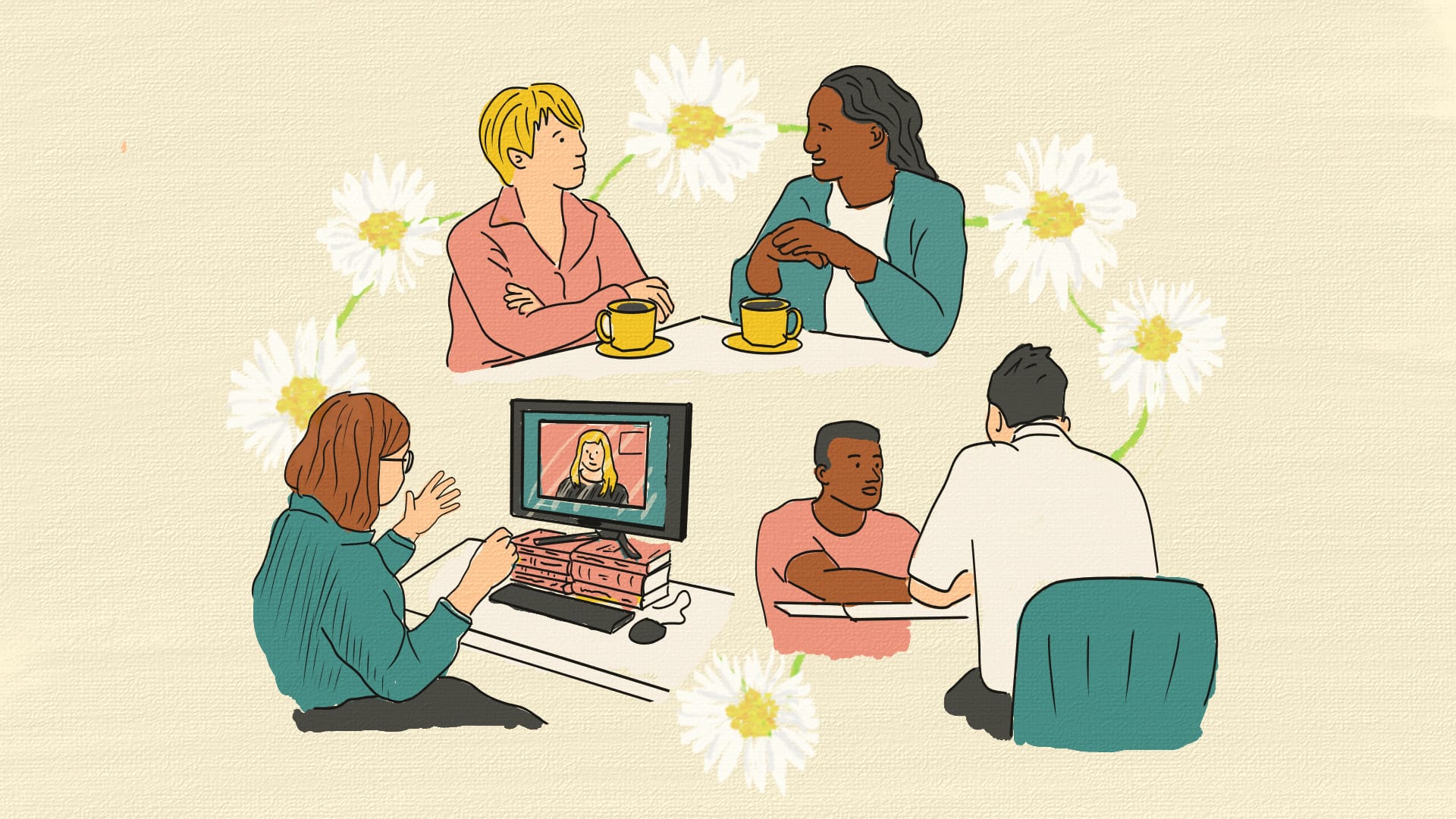Peer Supervision: A Quiet Revolution in Support Work
Support work can be isolating. Even in a team, you might find yourself working alone most days, with little time or space to reflect on how things are really going. At Equal Care, we’ve been developing a different way of doing things...

Support work can be isolating. Even in a team, you might find yourself working alone most days, with little time or space to reflect on how things are really going.
At Equal Care, we’ve been developing a different way of doing things - one that values listening over telling, and connection over hierarchy. Peer supervision is a small but important part of that shift.
It’s not about checking up on people, it’s not therapy, and it’s definitely not a performance review! It’s a simple, structured conversation with someone who understands your work and is trained to support you.
Where the idea comes from
The idea came from recognising how powerful peer support has been in mental health and other fields, and asking: what would happen if that kind of mutual, strengths-based support was brought into care work?
Amber, who led the design of what would later be named Peer Supervision (and the training around it), describes how it grew almost organically from how everything else is done at Equal Care:
“We looked at the standard model and asked: how do we already do things differently at Equal Care? We didn’t want to import supervision as a top-down process. We wanted to build something that starts from what people are already doing well - listening, building relationships, showing up - and give them the space to grow from there.”
Peer supervision was shaped not just to provide practical support, but to reflect the co-op’s core value of mutual care. It’s a way of recognising the emotional labour that support work involves and creating space and trust to reflect on it.
It’s also a way to bring care and support workers into more regular connection with one another - something that’s often missing in such a dispersed and demanding role. As Amber puts it:
“This role can be emotionally demanding, and often isolating. We wanted to create a simple but intentional space for reflection where people could feel encouraged, supported, and part of something shared.”
What it looks like
Individuals meet every couple of months - online or in person - with their peer supervisor. Sessions are around 45 minutes long and offer space to reflect on recent experiences, think through challenges, or talk about anything else that’s affecting how the work feels.
There’s no set agenda or checklist. It’s about creating a protected space for someone to speak freely and be heard.
Helen, who gives support in Calderdale, puts it plainly:
“I find receiving peer supervision very helpful as it breaks the isolation of the lone care worker. Although I am in a team I have not met all the team members despite having had three team meetings in the last six months. It is good to talk through an issue separate from the client, team owner or colleagues. It is also useful to talk about personal issues and how they may be impacting my work.”
There’s no fixed script, but the sessions follow a loose four-part structure:
- A check-in
- A space to reflect
- Time for questions or issues
- A check-out with a goal or plan for the next time
It’s structured enough to be useful, but informal enough to be relaxed.
“I like the relaxed atmosphere and the way I can talk through things.” Helen says. “It feels quite informal but I usually have some kind of goal or target set out at the end for me to look at by the next session.
Peer supervision is expected - independent workers have sessions at least every three months, and employed workers every two - but it’s designed to be supportive, not performative. It’s something you can rely on, not something you have to tick off.
Why it matters
It’s easy to put off reflection when you’re busy. But small issues have a way of becoming bigger if they’re left alone. Peer supervision gives people a space to share what’s going on before things start to get on top of them.
It also recognises that people giving care and support - employed or independent - need somewhere to ask questions, decompress, and sometimes just speak their mind.
“It’s a good opportunity to get support outside the teams you are in, and it can also break the isolation of the lone worker if you are the only person supporting a person, which I have been before.” - Helen
Alongside that, peer supervision offers people the chance to do something a little different from their day-to-day support work. Whether you're receiving supervision or giving it, it’s an opportunity to connect with others, think in a new way, and grow in confidence.
“I’ve never had an opportunity like this in any other employment.” - Sue
It’s also a way of embedding reflective practice into everyday life. As Amber puts it, the benefit isn’t only in being listened to - it’s also in listening. When someone shares something familiar, it can shift how you see your own experiences. Supporting someone else in reflecting can help you reflect too.
“Peer supervision sessions have provided me with an opportunity to nip issues in the bud before they affect my work. Not only do I reflect on my care skills but also my wider outlook or approaches to life, which can have an impact on how I work as part of a team or deal with work challenges.” - Sue
Becoming a supervisor
Where do these peer supervisors come from? Well, after six months with Equal Care, people giving care and support can apply to train as a peer supervisor themselves. The training is straightforward and designed to fit around other responsibilities. No special qualification is needed - just the ability to listen and the willingness to learn!
The time involved in doing peer support is paid by Equal Care, and gives some people giving support an opportunity to add to their monthly hours in a way that fits in with their other commitments.
“Training to be a peer supervisor was a great opportunity to increase my skills. It fits in well with my other interests outside of Equal Care, where I’m training to be a life coach.” - Sue
“I decided to train as a peer supervisor as I wanted to increase my work hours slightly without having to leave the house more due to my carer responsibilities. It is also something I had experience of in the NHS and I wanted to translate those skills into a more flexible Equal Care way of working.” - Helen
The training itself is designed to be accessible and grounded in everyday practice. It focuses on listening skills, setting boundaries, and using simple tools to support others through conversation. It’s not about becoming an expert - it’s about becoming confident in holding space for a peer and knowing when to ask questions, not give answers. People come away from the training with a better understanding of their role and the reassurance that they’re not doing it alone.
“The training was well-paced, clear, and a good chance to learn with others.” - Helen
No hierarchy. Just mutual support.
In most care organisations, supervision is something that happens to you, usually by someone higher up a chain of command. At Equal Care, we’ve changed that. Peer supervision works more like a daisy chain: A supports B, B supports C, and so on.
It isn’t about monitoring. It isn’t about managing. It’s about making space for the kind of conversations that help people feel less alone and more able to face challenges with clarity.
We expect participation - independent workers have sessions at least every three months, and employed workers every two - but we’ve worked to make sure it feels like something you can rely on, not something you have to tick off.
What members of Equal Care are building through peer supervision is a shared sense of responsibility: for themselves, for each other, and for the kind of working environment we all want to be part of.
It’s one of the ways we make sure people aren’t left to figure things out alone - and one of the clearest signs that we really do believe in our value of mutual care.
Looking ahead
Peer supervision isn’t just something we’re doing now - it’s something we want to grow and adapt. As it becomes more embedded in the co-op, we’re thinking about who else it could benefit and how it might evolve.
We know that the value of being listened to - and of listening - isn’t limited to those giving support. People receiving support are already taking part: one person is currently practicing as a peer supervisor, and another is going through the training. Over time, we hope to see even more people taking up this opportunity in ways that feel meaningful and empowering.
“The longer-term vision is to make peer support something that’s available to everyone - not just workers, but people receiving support too. Because everyone has something to offer, and everyone benefits from being listened to.” - Amber
Training for new peer supervisors is expected to restart in autumn 2025. If you are reading this as someone giving or receiving support with Equal Care and you're interested in taking part, or just want to know more about what's involved, get in touch with Amber.

